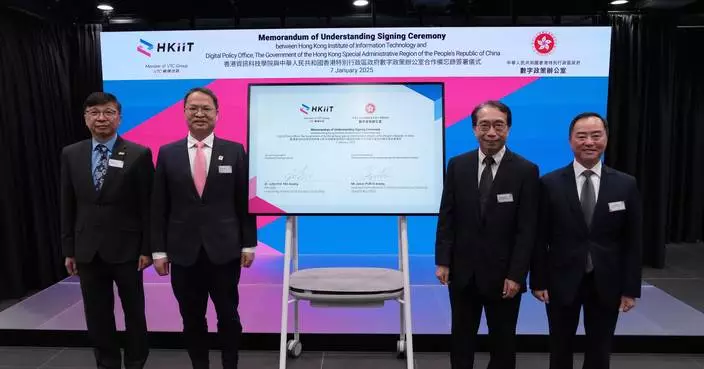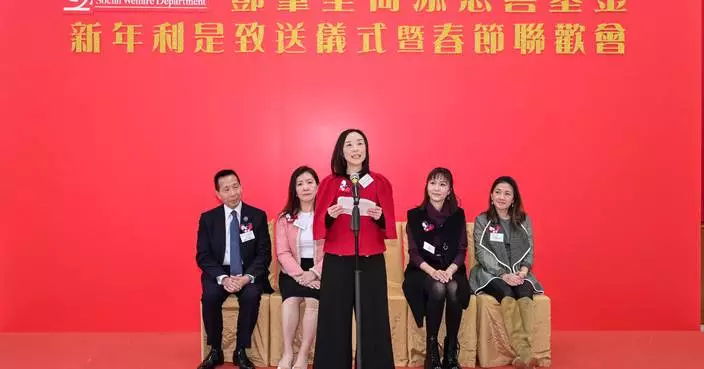DH announced latest situation of Legionnaires' Disease cases
The Centre for Health Protection (CHP) of the Department of Health today (January 6) reported the latest number of cases of Legionnaires' disease (LD), and reminded the public of the importance of using and maintaining properly designed man-made water systems, adding that susceptible groups should strictly observe relevant precautions.
From December 29, 2024, to January 4, 2025, the CHP recorded one imported LD case and one community-acquired LD case:
A 40-year-old male patient without underlying illnesses, who had been to the Mainland during the incubation period and was classified as an imported case; and
A 73-year-old male patient with underlying illnesses living in Yuen Long District.
"Epidemiological investigations are ongoing to identify potential sources of infection, high-risk exposure and clusters, if any," a spokesman for the CHP said.
As of January 4, two LD cases had been recorded this year. In 2024 and 2023, there were 135 and 121 LD cases respectively.
"Men, people aged over 50, smokers, alcoholics and persons with weakened immunity are more susceptible to LD. Some situations may also increase the risk of infection, including poor maintenance of water systems; living in areas with old water systems, cooling towers or fountains; using electric water heaters, whirlpools and spas or hot water spring spas; and recent stays in hotels or vessels," the spokesman said.
Legionellae are found in various environmental settings and grow well in warm water (20 to 45 degrees Celsius). They can be found in aqueous environments such as water tanks, hot and cold water systems, cooling towers, whirlpools and spas, water fountains and home apparatus that support breathing. People may become infected when they breathe in contaminated droplets (aerosols) and mist generated by artificial water systems, or when handling garden soil, compost and potting mixes.
Immunocompromised persons should:
Use sterile or boiled water for drinking, tooth brushing and mouth rinsing;
Avoid using humidifiers, or other mist- or aerosol-generating devices; and
If using humidifiers, or other mist- or aerosol-generating devices, fill the water tank with only sterile or cooled freshly boiled water, and not water directly from the tap. Also, clean and maintain humidifiers/devices regularly according to manufacturers' instructions. Never leave stagnant water in a humidifier/device. Empty the water tank, wipe all surfaces dry, and change the water daily.
The public should observe the health advice below:
Observe personal hygiene;
Do not smoke and avoid alcohol consumption;
Strainers in water taps and shower heads should be inspected, cleaned, descaled and disinfected regularly or at a frequency recommended by the manufacturer;
If a fresh-water plumbing system is properly maintained, it is not necessary to install domestic water filters. Use of water filters is not encouraged as clogging occurs easily, which can promote growth of micro-organisms. In case water filters are used, the pore size should be 0.2 micrometres (µm) and the filter needs to be changed periodically according to the manufacturer's recommendations;
Drain and clean water tanks of buildings at least quarterly;
Drain or purge for at least one minute infrequently used water outlets (e.g. water taps, shower heads and hot water outlets) and stagnant points of the pipework weekly or before use;
Seek and follow doctors' professional advice regarding the use and maintenance of home respiratory devices and use only sterile water (not distilled or tap water) to clean and fill the reservoir. Clean and maintain the device regularly according to the manufacturer's instructions. After cleaning/disinfection, rinse the device with sterile water, cooled freshly boiled water or water filtered with 0.2 µm filters. Never leave stagnant water in the device. Empty the water tank, keep all surfaces dry, and change the water daily; and
When handling garden soil, compost and potting mixes:
Wear gloves and a face mask;
Water gardens and compost gently using low pressure;
Open composted potting mixes slowly and make sure the opening is directed away from the face;
Wet the soil to reduce dust when potting plants; and
Avoid working in poorly ventilated places such as enclosed greenhouses.
The public may visit the CHP'sLD page, theCode of Practice for Prevention of LDand theHousekeeping Guidelines for Cold and Hot Water Systems for Building Managementof the Prevention of LD Committee, and the CHP'srisk-based strategyfor prevention and control of LD.
Hong Kong's latest foreign currency reserve assets figures released
The following is issued on behalf of the Hong Kong Monetary Authority:
The Hong Kong Monetary Authority (HKMA) announced today (January 7) that the official foreign currency reserve assets of Hong Kong amounted to US$421.4 billion as at the end of December 2024 (end-November 2024: US$425.1 billion) (Annex).
There were no unsettled foreign exchange contracts at end-December and end-November 2024.
The total foreign currency reserve assets of US$421.4 billion represent over five times the currency in circulation or about 39 per cent of HongKong dollar M3.
****************************************************************
At present, four press releases relating to the Exchange Fund's data are issued by the HKMA each month. Three of these releases are issued to disseminate monetary data in accordance with International Monetary Fund's Special Data Dissemination Standard (SDDS). The fourth press release, on the Exchange Fund's Abridged Balance Sheet and Currency Board Account, is made in accordance with the HKMA's policy of maintaining a high level of transparency. For the month of January 2025, the scheduled dates for issuing the press releases are as follows:
January 7 |
SDDS International Reserves
(Hong Kong's Latest Foreign Currency Reserve Assets Figures) |
January 14 |
SDDS Analytical Accounts of the Central Bank
(Analytical Accounts of the Exchange Fund) |
January 28 |
SDDS Template on International Reserves and
Foreign Currency Liquidity |
January 28 |
Exchange Fund Abridged Balance Sheet and
Currency Board Account |








